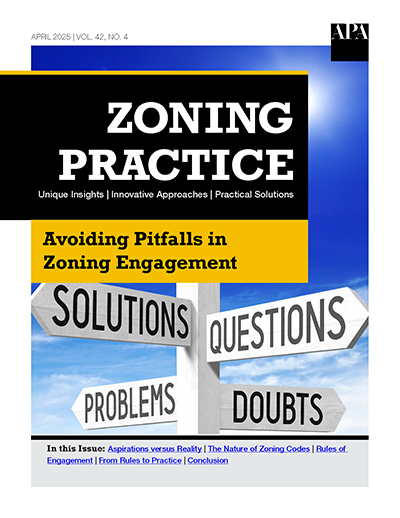Avoiding Pitfalls in Zoning Engagement
Zoning Practice — April 2025
By Christian Neuschmidt, AICP

Not a member but want to buy a copy? You'll need to create a free My APA account to purchase.
Create account
Anika Singh Lemar and other commentators have noted that our current models for public participation are (1) not built to hear underrepresented voices, (2) do not have the capacity to address misinformation meaningfully, and (3) do not assist local decision-makers in deciding what information is productive and useful to the process (see "Doing Public Participation Better" in the September 2024 issue of Zoning Practice). These problems only compound the more complex the topic considered at a given public participation session is.
For comprehensive planning or community visioning, the effectiveness of public participation is typically dependent on how well-conceived the public participation itself is. This is because comprehensive planning processes typically seek to resolve general questions without considering the specific consequences of resultant policies on the day-to-day lives of individuals who took part in the public participation process. Zoning, on the other hand, acts as "software" that handles the details of how to realize the vision of the plan. Like software, zoning is effectively language-based machinery to take conceptual ideas and make them a reality. Because they require technical drafting and specific consideration of a lot of different contexts, though, the role of public engagement in developing these tools remains an open question.
This issue of Zoning Practice explores the distinct challenges associated with engaging the public around zoning changes. It highlights how these challenges relate to the intrinsic nature of zoning codes and presents rules of engagement to ensure public participation in zoning changes is efficient, topical, and effective.
Details
About the Author
Christian Neuschmidt, AICP
<p>Christian Neuschmidt, AICP is an Associate in Clarion Associate's Chapel Hill Office, where he writes zoning codes and comprehensive plans for communities in the Southeast. He received his Master in Urban Planning from Harvard Graduate School of Design, with a focus in Housing, Community, and Economic Development. While at Harvard, Christian co-founded the GSD's rural advocacy organization and participatory spatial and process design, emphasizing the importance of negotiation and mediation to successful planning. Christian hopes to use his experiences to shape strong, citizen-focused communities that inspire generosity, neighborliness, and joy.</p>


